2020版新高考英语考前保分训练江苏版讲义专题一第9节
- 格式:pdf
- 大小:65.66 KB
- 文档页数:10

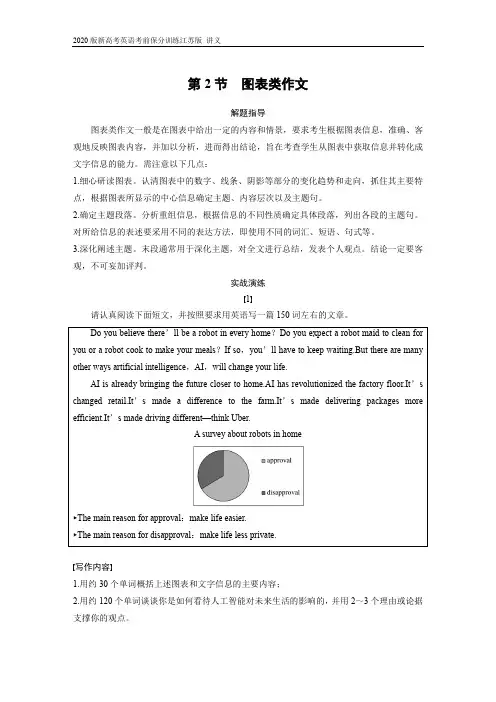
第2节图表类作文解题指导图表类作文一般是在图表中给出一定的内容和情景,要求考生根据图表信息,准确、客观地反映图表内容,并加以分析,进而得出结论,旨在考查学生从图表中获取信息并转化成文字信息的能力。
需注意以下几点:1.细心研读图表。
认清图表中的数字、线条、阴影等部分的变化趋势和走向,抓住其主要特点,根据图表所显示的中心信息确定主题、内容层次以及主题句。
2.确定主题段落。
分析重组信息,根据信息的不同性质确定具体段落,列出各段的主题句。
对所给信息的表述要采用不同的表达方法,即使用不同的词汇、短语、句式等。
3.深化阐述主题。
末段通常用于深化主题,对全文进行总结,发表个人观点。
结论一定要客观,不可妄加评判。
实战演练1请认真阅读下面短文,并按照要求用英语写一篇150词左右的文章。
make life easier.The main reason for disapproval:make life less private.写作内容1.用约30个单词概括上述图表和文字信息的主要内容;2.用约120个单词谈谈你是如何看待人工智能对未来生活的影响的,并用2~3个理由或论据支撑你的观点。
写作要求1.写作过程中不能直接引用原文语句;2.作文中不能出现真实姓名和学校名称;3.不必写标题。
评分标准内容完整,语言规范,语篇连贯,词数适当。
参考范文Artificial intelligence is working and will change our life,but as for robots in home,most people welcome it,believing it will make life easier,while others being against it for the sake of life privacy.As far as I am concerned,artificial intelligence,on the one hand,will bring great benefits to mankind.In industry,artificial intelligence will have an irreplaceable position in promoting efficiency and production.In life,it can be used to do some tasks for us in offices or homes,thus enabling us to enjoy more leisure time.On the other hand,what should be noted is that we can’t deny artificial intelligence will give us some negative impacts.For instance,unavoidably it will replace labor workers,adding to the unemployment.What’s more,privacy is a great concern to us.Nevertheless,we should hold a positive attitude towards the impacts brought about by artificial intelligence,embracing its advantages but dismissing the disadvantages.After all,artificial intelligence has become a social trend.2请认真阅读下面图表和文字,并按照要求用英语写一篇150词左右的文章。
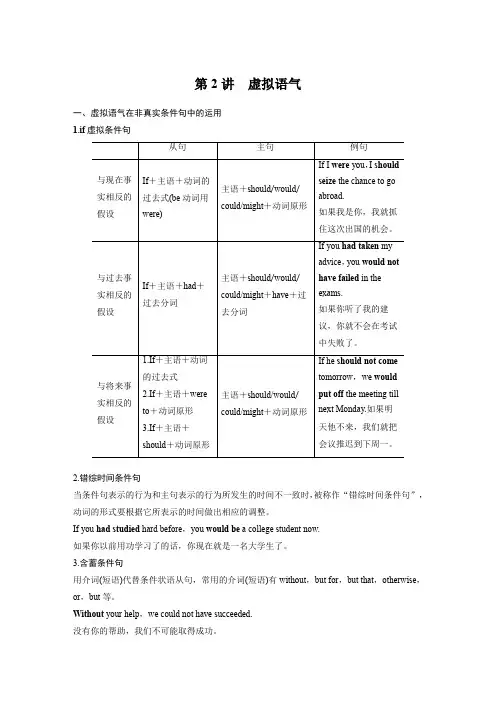
第2讲虚拟语气一、虚拟语气在非真实条件句中的运用1.if虚拟条件句2.错综时间条件句当条件句表示的行为和主句表示的行为所发生的时间不一致时,被称作“错综时间条件句”,动词的形式要根据它所表示的时间做出相应的调整。
If you had studied hard before,you would be a college student now.如果你以前用功学习了的话,你现在就是一名大学生了。
3.含蓄条件句用介词(短语)代替条件状语从句,常用的介词(短语)有without,but for,but that,otherwise,or,but等。
Without your help,we could not have succeeded.没有你的帮助,我们不可能取得成功。
But for electricity,there would be no modern industry.要是没有电,就没有现代工业。
He felt very tired yesterday,or he would have attended the party.他昨天太累了,否则他会参加派对的。
4.“要不是因为……”的句型(1)If it were not for...,I would/could/should/might do...要不是因为……,我现在就……(对现在的虚拟)。
(2)If it had not been for...,I would/could/should/might have done...要不是因为……,我当时就……(对过去的虚拟)。
If it were not for free tickets,I would not go to the cinema so frequently.要不是因为免费的电影票,我不会那么频繁地去看电影。
If it had not been for your timely assistance in giving me first aid,the consequences might have been much serious.如果当时在对我急救的过程中没有你的及时帮助,后果也许是非常严重的。
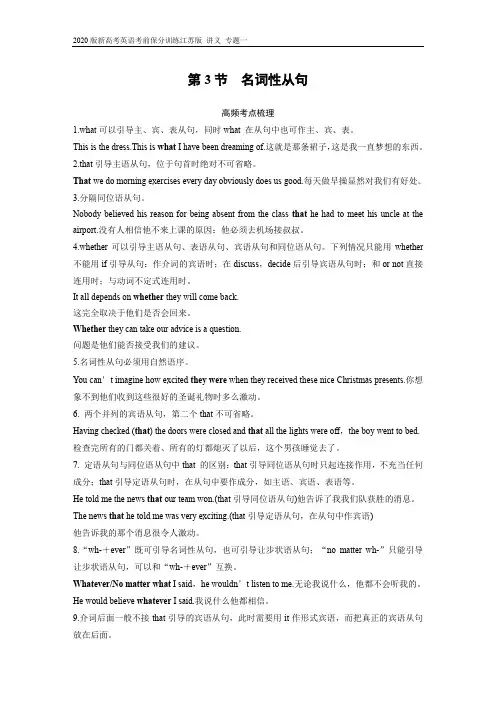
第3节名词性从句高频考点梳理1.what可以引导主、宾、表从句,同时what 在从句中也可作主、宾、表。
This is the dress.This is what I have been dreaming of.这就是那条裙子,这是我一直梦想的东西。
2.that引导主语从句,位于句首时绝对不可省略。
That we do morning exercises every day obviously does us good.每天做早操显然对我们有好处。
3.分隔同位语从句。
Nobody believed his reason for being absent from the class that he had to meet his uncle at the airport.没有人相信他不来上课的原因:他必须去机场接叔叔。
4.whether可以引导主语从句、表语从句、宾语从句和同位语从句。
下列情况只能用whether 不能用if引导从句:作介词的宾语时;在discuss,decide后引导宾语从句时;和or not直接连用时;与动词不定式连用时。
It all depends on whether they will come back.这完全取决于他们是否会回来。
Whether they can take our advice is a question.问题是他们能否接受我们的建议。
5.名词性从句必须用自然语序。
You can’t imagine how excited they were when they received these nice Christmas presents.你想象不到他们收到这些很好的圣诞礼物时多么激动。
6. 两个并列的宾语从句,第二个that不可省略。
Having checked (that) the doors were closed and that all the lights were off,the boy went to bed. 检查完所有的门都关着、所有的灯都熄灭了以后,这个男孩睡觉去了。
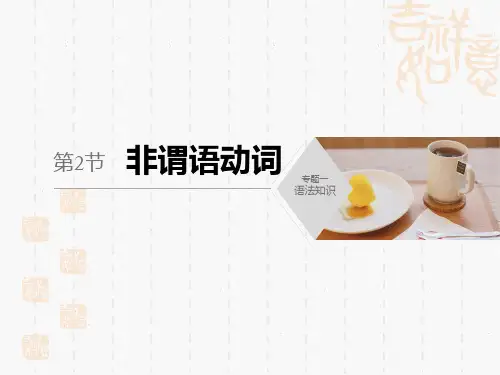
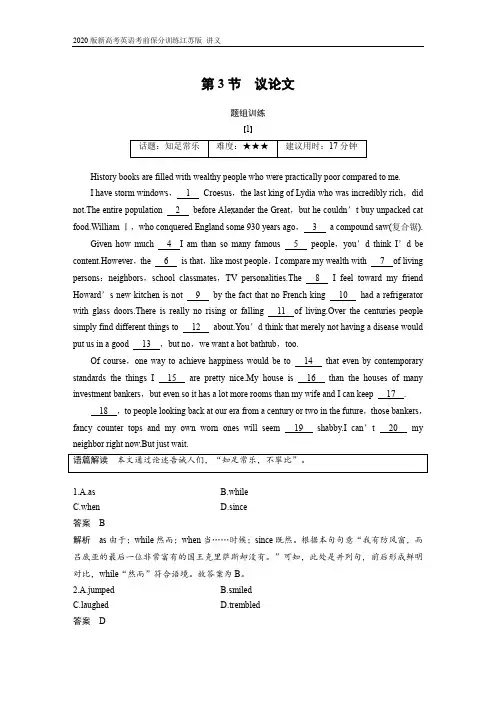
第3节议论文题组训练1History books are filled with wealthy people who were practically poor compared to me.I have storm windows, 1 Croesus,the last king of Lydia who was incredibly rich,did not.The entire population 2 before Alexander the Great,but he couldn’t buy unpacked cat food.William Ⅰ,who conquered England some 930 years ago, 3 a compound saw(复合锯).Given how much 4 I am than so many famous 5 people,you’d think I’d be content.However,the 6 is that,like most people,I compare my wealth with 7 of living persons:neighbors,school classmates,TV personalities.The 8 I feel toward my friend Howard’s new kitchen is not 9 by the fact that no French king 10 had a refrigerator with glass doors.There is really no rising or falling 11 of living.Over the centuries people simply find different things to 12 about.You’d think that merely not having a disease would put us in a good 13 ,but no,we want a hot bathtub,too.Of course,one way to achieve happiness would be to 14 that even by contemporary standards the things I 15 are pretty nice.My house is 16 than the houses of many investment bankers,but even so it has a lot more rooms than my wife and I can keep 17 .18 ,to people looking back at our era from a century or two in the future,those bankers,fancy counter tops and my own worn ones will seem 19 shabby.I can’t 20 my neighbor right now.But just wait.1.A.as B.whileC.whenD.since答案 B解析as由于;while然而;when当……时候;since既然。
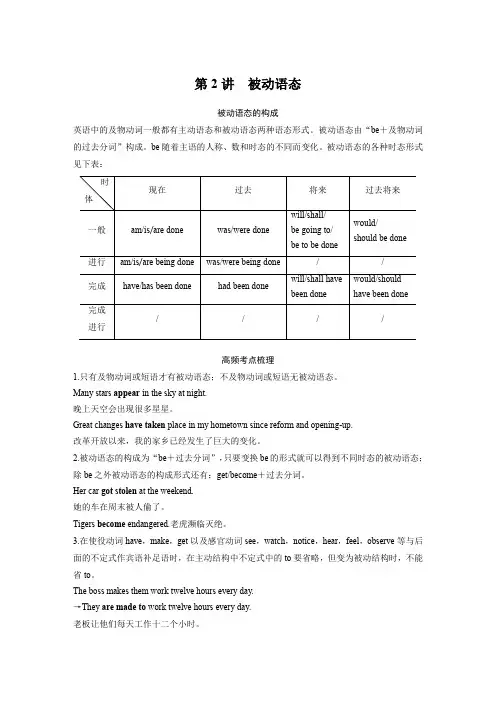
第2讲被动语态被动语态的构成英语中的及物动词一般都有主动语态和被动语态两种语态形式。
被动语态由“be+及物动词的过去分词”构成。
be随着主语的人称、数和时态的不同而变化。
被动语态的各种时态形式见下表:高频考点梳理1.只有及物动词或短语才有被动语态;不及物动词或短语无被动语态。
Many stars appear in the sky at night.晚上天空会出现很多星星。
Great changes have taken place in my hometown since reform and opening-up.改革开放以来,我的家乡已经发生了巨大的变化。
2.被动语态的构成为“be+过去分词”,只要变换be的形式就可以得到不同时态的被动语态;除be之外被动语态的构成形式还有:get/become+过去分词。
Her car got stolen at the weekend.她的车在周末被人偷了。
Tigers become endangered.老虎濒临灭绝。
3.在使役动词have,make,get以及感官动词see,watch,notice,hear,feel,observe等与后面的不定式作宾语补足语时,在主动结构中不定式中的to要省略,但变为被动结构时,不能省to。
The boss makes them work twelve hours every day.→They are made to work twelve hours every day.老板让他们每天工作十二个小时。
4.主动形式表示被动含义:(1)某些连系动词feel,look,seem,appear,taste,sound,smell,prove,remain等可用主动形式表示被动意义,主语通常是事物。
The water feels warm.水摸上去很温。
The dish smells good.这道菜闻起来很香。
(2)表示主语的某种属性、特性、性能或品质的词:read,write,act,cut,draw,drive,sell,wash,clean,wear,open,lock,look,shut等。
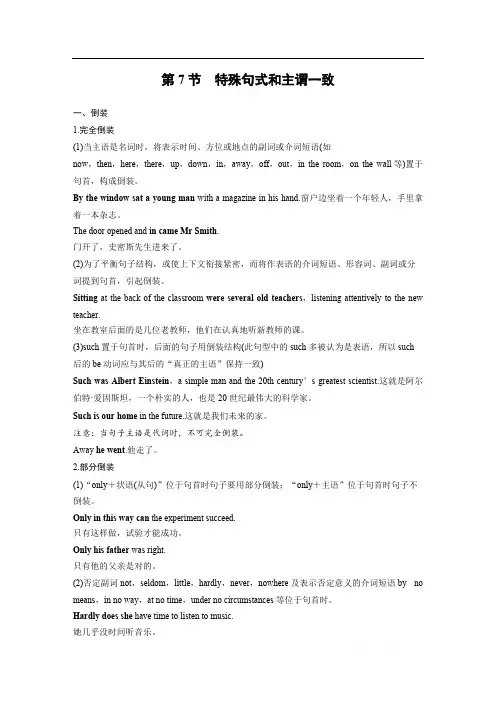
第7节 特殊句式和主谓一致一、倒装1.完全倒装(1)当主语是名词时,将表示时间、方位或地点的副词或介词短语(如now,then,here,there,up,down,in,away,off,out,in the room,on the wall等)置于句首,构成倒装。
By the window sat a young man with a magazine in his hand.窗户边坐着一个年轻人,手里拿着一本杂志。
The door opened and in came Mr Smith.门开了,史密斯先生进来了。
(2)为了平衡句子结构,或使上下文衔接紧密,而将作表语的介词短语、形容词、副词或分词提到句首,引起倒装。
Sitting at the back of the classroom were several old teachers,listening attentively to the new teacher.坐在教室后面的是几位老教师,他们在认真地听新教师的课。
(3)such置于句首时,后面的句子用倒装结构(此句型中的such多被认为是表语,所以such后的be动词应与其后的“真正的主语”保持一致)Such was Albert Einstein,a simple man and the 20th century’s greatest scientist.这就是阿尔伯特·爱因斯坦,一个朴实的人,也是20世纪最伟大的科学家。
Such is our home in the future.这就是我们未来的家。
注意:当句子主语是代词时,不可完全倒装。
Away he went.他走了。
2.部分倒装(1)“only+状语(从句)”位于句首时句子要用部分倒装;“only+主语”位于句首时句子不倒装。
Only in this way can the experiment succeed.只有这样做,试验才能成功。
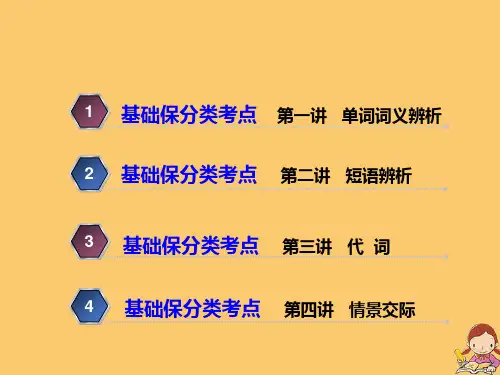

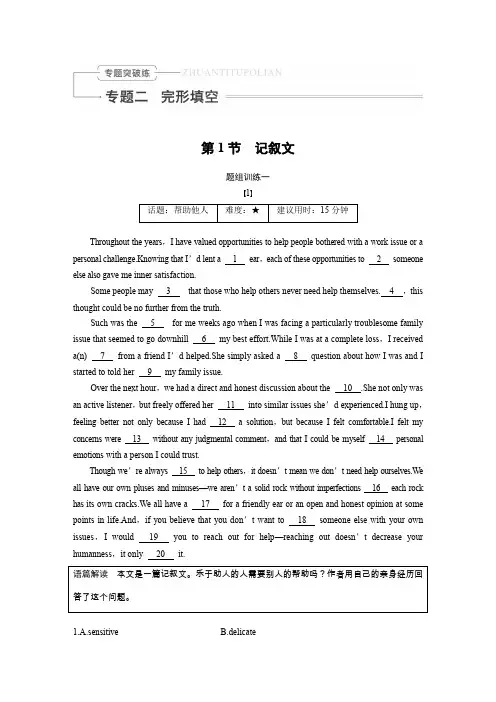
第1节记叙文题组训练一1Throughout the years,I have valued opportunities to help people bothered with a work issue or a personal challenge.Knowing that I’d lent a 1 ear,each of these opportunities to 2 someone else also gave me inner satisfaction.Some people may 3 that those who help others never need help themselves. 4 ,this thought could be no further from the truth.Such was the 5 for me weeks ago when I was facing a particularly troublesome family issue that seemed to go downhill 6 my best effort.While I was at a complete loss,I received a(n) 7 from a friend I’d helped.She simply asked a 8 question about how I was and I started to told her 9 my family issue.Over the next hour,we had a direct and honest discussion about the 10 .She not only was an active listener,but freely offered her 11 into similar issues she’d experienced.I hung up,feeling better not only because I had 12 a solution,but because I felt comfortable.I felt my concerns were 13 without any judgmental comment,and that I could be myself 14 personal emotions with a person I could trust.Though we’re always 15 to help others,it doesn’t mean we don’t need help ourselves.W e all have our own pluses and minuses—we aren’t a solid rock without imperfections 16 each rock has its own cracks.We all have a 17 for a friendly ear or an open and honest opinion at some points in life.And,if you believe that you don’t want to 18 someone else with your own issues,I would 19 you to reach out for help—reaching out doesn’t decrease your humanness,it only 20 it.1.A.sensitive B.delicateC.sympatheticprehensive答案 C解析知道自己倾听了别人的心声,这样帮助别人的机会也给了作者内心的满足感。
第 9 讲不落俗套的亮点词汇要想写出一篇水平比较高的书面表达,高级词汇的使用必不可少,它会大大提升文章的档次,从而帮助考生获得高分。
要做到准确使用高级词汇,应该注意以下几个方面:一、使用亮点词汇的 4 种方法1.标新立异“语”众不同在写作时,恰当地使用一些别人可能想不到的词汇或表达,会体现出自己的高水平。
(1)Our team,besides regular training,will join in a variety of activities.→Our team , apart/aside from regular training,will join in a variety of activities.(2017 ·全国Ⅲ)(2)Several days later , when the video was played on the graduation ceremony, it was very popular .→Several days later , when the video was played on the graduation ceremony , it was well received .(2017 ·北京)2.多样表达避免重复在写作时应尽量避免重复使用相同的单词或短语,要尽量用贴切多样的词语来展示自己的水平。
用词不同、表达方式迥异,也是高级用法。
(1)First of all,you’d better arrive on time because it is polite to be on timein China.→First of all ,you’d better arrive on time because it is polite to be punctualin China.(2)We’ve built a new experiment building and we ’ve also built(2018 ·全国Ⅰ) a library where theold playground used to be.→We’ve built a new experiment building and we ’ve also set up a library where the old playground used to be.3.单词短语短语优先在单词和短语表示同一个意思时,优先使用短语。
第5节动词的时态和语态第1讲时态重点句型1.It/This is the first time that sb. has done...这是某人第一次做某事It/This was the first time that sb. had done...这是某人第一次做某事It is the first time that he has performed on such a big stage.这是他第一次在如此大的舞台上表演。
It was the third time that he had been out of work that year.这是他那一年第三次失业。
2.It is/has been...since sb. did sth. 自从某人过去做某事以来已经…… (since后接过去时)sb. has done sth. since/ever since/since thenI have known him ever since I was a child.我自孩提时代起就已经认识他了。
My computer broke down and my essay has been left unfinished since.我的电脑坏了,我的文章至今还没有写完。
I’ve been on the go ever since eight o’clock this morning.我从早晨八点钟起就一直忙个不停。
3.It/This is the best (worst,most interesting等) that sb. has done sth.It is the most interesting book that I have ever read.这是我读过的最有趣的一本书。
4.It won’t be long before sb. does sth. 不久之后某人将会……(before引导的时间状语从句中用一般现在时代替一般将来时)It won’t be long before we see each other again.我们不久之后就会见面了。
第6节并列句和状语从句并列句的易错点1.从属连词because不能与并列连词so连用;although和though不能与but连用,但可以与yet连用。
Though he is young,he knows a lot.虽然他很小,但懂得很多。
2.not only 位于句首时,其后的分句要部分倒装,但but also后的分句仍用正常语序。
有时also 可以省略。
Not only did the dog bark at him,but it bit him.这只狗不但对他吠叫,而且咬了他。
3.for分句只能位于句尾,且其前面需用逗号隔开。
它所连接的分句只是对前面的分句加以解释,补充说明理由或推断原因。
The day breaks,for the birds are singing.天亮了,因为鸟在叫。
4.在“祈使句+and+陈述句”结构中,祈使句的意义相当于if引导的条件状语从句的肯定式;而在“祈使句+or/otherwise+陈述句”结构中,祈使句的意义相当于if引导的条件状语从句的否定式。
Work hard,and you’ll be successful in time.(=If you work hard,you’ll be successful in time.) 努力工作,你会成功的。
Hurry up,or we’ll not catch the early bus.(=If we don’t hurry up,we’ll not catch the early bus.)快点,否则我们就赶不上早班车了。
状语从句的高频考点1.when(1)引导原因状语从句,意为“既然”。
Why do you want to find a new job when you have a good job already?既然你已经有了一份好工作,你为什么还想找新工作?(2)引导时间状语从句,意为“这时(突然)”。
第9节交际用语高考题组1.—Let’s take a coffee break.江苏,35)—________ We’ve been working for hours.(2019·A.Why bother?B.What for?C.You got me there.D.You said it.答案 D解析考查情景交际。
——让我们喝杯咖啡休息一会儿吧。
——正合我意。
我们已经工作好几个小时了。
Why bother何必那么麻烦;What for为什么;You got me there你把我给难住了;You said it正合我意。
2.—I guess you want to go play tennis.天津,1)—________.That’s exactly what I was thinking too.(2019·A.I didn’t get itB.It’s up to youC.You never knowD.You read my mind答案 D解析考查交际用语。
——我猜,你想去打网球。
——你猜到我的心思了,我正是那么想的。
根据语境和后面的“我正是那么想的”可知,D项“你猜到我的心思了”正确。
I didn’t get it我没明白;It’s up to you由你决定;You never know很难说,难以预料。
3.—My son got a full scholarship to his dream university!—Wow,________!What’s he going to study?(2019·天津,6)A.good for himB.go for itC.what a coincidenceD.all the best答案 A解析考查交际用语。
——我儿子得到了他理想的大学的全额奖学金!——哇,他真棒!他要学什么专业?good for him真行,真棒;go for it放手向前,努力争取吧;what a coincidence 真巧;all the best一切顺利,万事如意。
结合语境可知,应选A。
4.—You know what?I’ve got a New Year concert ticket.江苏,28)—Oh,________ You’re kidding.(2018·A.so what?B.go ahead.e on.D.what for?答案 C解析句意为:——你猜怎么着?我有一张新年音乐会的票。
——噢,得了吧。
你在开玩笑吧。
so what意为“那又怎么样呢”,表示对对方说的话不以为然;go ahead意为“去吧,干吧”,用于鼓励别人;come on可意为“加油”,用于激励别人,也可意为“得了吧,怎么会呢”,表示不相信;what for用于询问目的,意为“为了什么”。
由语境可知C项正确。
5.—What happened?Your boss seems to ________.—Didn’t you know his secretary leaked the secret report to the press?(2018·江苏,35)A.be over the moonugh his head offC.be all earsD.fly off the handle答案 D解析句意为:——发生了什么事?你的老板似乎________。
——难道你不知道他的秘书把这个秘密报告泄露给了新闻记者了吗?D项fly off the handle意为“大发雷霆”,符合语境。
be over the moon欣喜若狂;laugh his head off大笑不止,狂笑不已;be all ears全神贯注地听,洗耳恭听。
6.—Wasn’t Joan supposed to be here by now?—________.She will be here in about twenty minutes.(2018·天津,1)A.All rightB.Don’t worryC.No wonderD.Enjoy yourself答案 B解析句意为:——难道现在琼不应该在这里吗?——别担心。
她大约20分钟后到。
Don’t worry意为“别担心”,符合语境,故选B。
All right好的;No wonder难怪;Enjoy yourself 玩得开心。
7.—I’m moving in a few days and I wonder if you could help.—________.Just let me know when,and I’ll be there.(2018·天津,5)A.You betB.It dependsC.Forget itD.No kidding答案 A解析句意为:——几天以后我就要搬走了,我想知道你能否帮一下忙。
——肯定的。
搬的时候告诉我一声,我就会去的。
You bet意为“当然,肯定的”,符合语境,故选A。
It depends 视情况而定;Forget it没关系,不必在意,别提它了;No kidding不开玩笑,说真的。
8.—Going to watch the Women’s Volleyball Match on Wednesday?—________!Will you go with me?(2017·江苏,35)A.You thereB.You betC.You got meD.You know better答案 B解析句意为:——周三看女排比赛吗?——________!你跟我一起去好吗?从对话的连贯性来看,这里应选B项You bet来回答前面的问句,表示“当然啦,一点儿不错”。
You there 表示打招呼,无实际意义;You got me你明白我的意思了;You know better你不会不知道吧。
9.—Albert’s birthday is on next Saturday,and I’m planning a surprise party for him.天津,1)—________.I’ll bring some wine.(2017·A.Sounds like funB.It dependsC.Just a minuteD.You are welcome答案 A解析句意为:——艾伯特下周六过生日,我正筹划聚会给他一个惊喜。
——听起来很有趣(Sounds like fun)。
我会带一些葡萄酒来。
It depends那得看情况;Just a minute请稍等;You are welcome不客气。
10.—Michael was late for Mr Smith’s chemistry class this morning.天津,7)—________?As far as I know,he never came late to class.(2017·A.So whatB.Why notC.Who caresD.How come答案 D解析句意为:——今天早上迈克尔在史密斯先生的化学课上迟到了。
——怎么会呢(How come)?据我所知,他上课从未迟到过。
So what那又怎样;Why not为什么不呢;Who cares 管它呢,谁管呢。
11.—Only those who have a lot in common can get along well.江苏,32)—________.Opposites sometimes do attract.(2016·A.I hope notB.I think soC.I appreciate thatD.I beg to differ答案 D解析句意为:——只有那些志趣相投的人才能够友好相处。
——恕我不敢苟同,有时兴趣相反的人却能相互吸引。
根据答语第二句“Opposites sometimes do attract.”可知,答话者并不同意对方的说法。
I beg to differ恕我不能赞同,符合语境。
I hope not我希望不是这样;I think so我认为是这样;I appreciate that我很欣赏。
12.—Are you sure you’re ready for the test?浙江,1)—________.I’m well prepared for it.(2016·A.I’m afraid notB.No problemC.Hard to sayD.Not really答案 B解析句意为:——你确定为考试做好准备了吗?——没问题,我准备好了。
I’m afraid not恐怕不行;No problem没问题;Hard to say很难说;Not really不完全是,不见得。
根据语境知选B。
13.—The movie starts at 8∶30,and we can have a quick bite before we go.浙江,20)—________.See you at 8∶10.(2016·A.So longB.Sounds greatC.Good luckD.Have a good time答案 B解析句意为:——电影将在八点半开始,走之前我们可以随便吃点什么。
——听起来不错。
八点十分见。
Sounds great听起来不错,用来表示同意对方的建议,符合语境。
So long再见;Good luck祝你好运;Have a good time玩得愉快。
14.—It was a wonderful trip.So,which city did you like better,Paris or Rome?天津,1)—________.There were good things and bad things about them.(2016·A.It’s hard to sayB.I didn’t get itC.You must be kiddingD.Couldn’t be better答案 A解析句意为:——这是一次美好的旅行。
那么,你更喜欢哪座城市,巴黎还是罗马?——很难说。
它们各有优缺点。
It’s hard to say意为“很难说”,符合语境。
I didn’t get it我不明白;You must be kidding你一定是在开玩笑;Couldn’t be better再好不过了。
15.—Jim,can you work this Sunday?江苏,23)—________?I’ve been working for two weeks on end.(2015·A.Why meB.Why notC.What ifD.So what答案 A解析句意为:——吉姆,这个星期天你能工作吗?——为什么是我?我已经连续工作两个星期了。